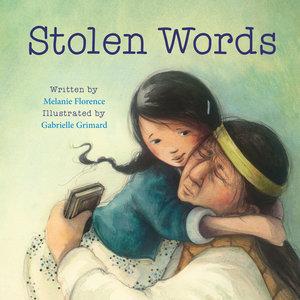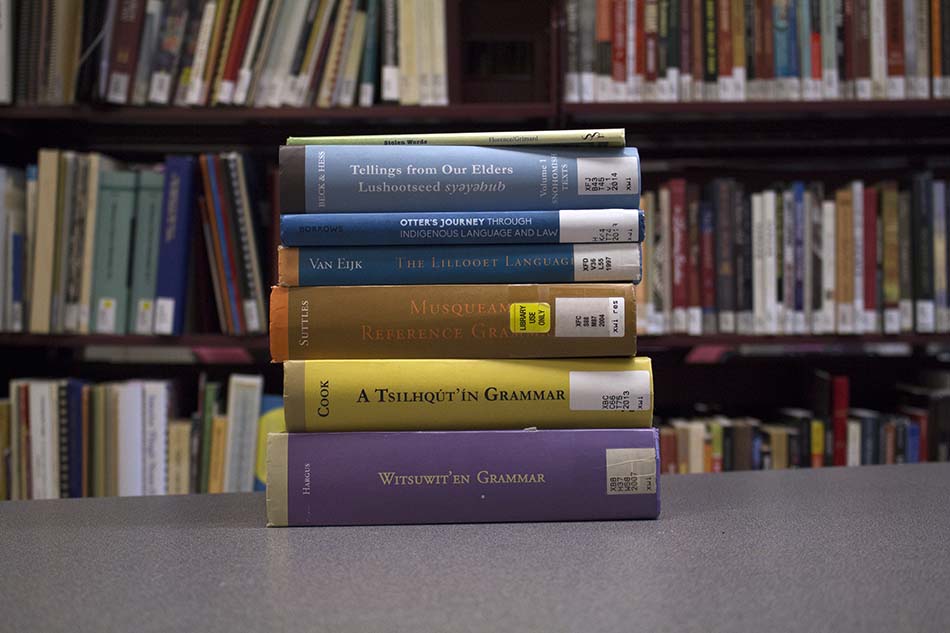June is National Indigenous History Month in Canada, and 2019 is the United Nations International Year of Indigenous Languages. British Columbia’s Indigenous languages make up more than 50% of the approximately 61 languages indigenous to Canada, according to the First Peoples’ Cultural Council.
Language Sciences asked the team at the Xwi7xwa Library to highlight some useful resources available to everyone that can help readers learn more about the history of B.C.’s Indigenous languages this month, and year. From online language maps to picture books, dictionaries to flashcards, here are some resources the team have highlighted to help you get your learning started - some available with a click of a link, and some available to be read within the Xwi7xwa Library itself.
Xwi7xwa Library team: First Voices is an online Indigenous language resource containing a multitude of tools and services for people involved and interested in Indigenous language revitalization. These resources include brief historical overviews as well as language keyboards, grammar guides, stories and pronunciation guides for 13 Indigenous languages.
First Peoples’ Cultural Council Language Map
Xwi7xwa Library team: First Peoples’ Cultural Council’s (FPCC) online language map is a great tool for exploring the wide variety of languages found in B.C. The map divides what is now called B.C. into rough geographically-based language groups. Users can interact with the map and click to learn more about languages.
First Peoples’ Cultural Council report on the status of B.C. languages
Xwi7xwa Library team: FPCC is a leader in language revitalization efforts. This 2018 report on Indigenous languages in B.C. features an historical overview of languages, easily understandable infographics and helps people to understand the current situation of Indigenous languages in B.C.
First Nations Language Series
Xwi7xwa Library team: UBC Press’ First Nations Language Series (pictured) contains excellent dictionaries, grammar guides, and traditional stories for B.C.-based languages, including Lillooet, Musqueam and Witsuwit’en among others that would be especially interesting for linguists or anthropologists.
Available at Xwi7xwa Library in our Language section (call numbers begin with 'X'.)

Image credit: Melanie Florence and Gabrielle Grimard
Stolen Words by Melanie Florence, illustrated by Gabrielle Grimard
Xwi7xwa Library team: Stolen Words is a children’s picture book that follows the story of a young Cree girl who learns about her grandfather’s experience in residential schools and learns Cree with him. A great book to introduce children (and adults!) to residential schools and their impact on Indigenous languages.
Available at UBC’s Xwi7xwa, Education (also in French) and Okanagan libraries as well as Vancouver, Burnaby and Richmond public libraries.
Xwi7xwa Library team: Indigenous Foundations is an online resource that traces the impact of residential schools on language and the politically and legally constructed nature of words like “Indian”, “band” and “First Nations.” It has a wealth of information about Indigenous issues. (See tab on “Identity -> Terminology” and “Culture -> Oral Traditions & Languages”)
“Ancestral language essential to Indigenous identities in Canada”
Xwi7xwa Library team: Written by associate professor and Canada Research Chair in the Faculty of Education at the University of Manitoba, Frank Deer, this article provides an overview of current politics surrounding Indigenous language revitalization and education in Canada, supplemented by Deer’s personal experience in education.
“Why it’s important to protect indigenous languages”
Xwi7xwa Library team: From Indigenous author Bob Joseph’s blog, this article provides an overview of the historical loss of Indigenous languages, revitalization efforts and includes a brief discussion of the Truth and Reconciliation Commission’s calls to action about Indigenous languages and what people can do to help. His blog features many other articles about language.
The Xwi7xwa Library also contains a larger Language section, which includes research guides for Indigenous Languages and Languages of B.C. for students, staff and community members interested in language research, as well as language flashcards for Salish and Ojibwe languages. Other resources include the CBC Indigenous Original Voices website and the UNESCO Atlas of Languages in Danger. And in addition, UBC Vancouver’s First Nations and Endangered Languages program provides courses for anyone interested in learning Indigenous languages for credit.
Click here to learn more about the Xwi7xwa Library, including how to borrow resources.
